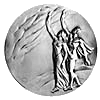 |
 |
| current issue |  |
past issues |  |
send a letter/news |  |
address update |  |
advertise |  |
about us |  |
alumni home |
On Ben's Farm
An Incurable Individualistby Mylinda Woodward '97
In the spring of 1894, Dean Charles H. Pettee sent a chatty letter to his wife, Luella, telling her about his week. "Saturday afternoon after dinner I played ball with the [college] boys for two hours," he wrote. "I kept up my reputation as a second baseman by catching a difficult fly. Don't know but I have missed my calling." He was joking, of course. Both knew that nothing could be further from the truth.
 Charles H. Pettee - courtesy of University Archives |
At the time he wrote the letter, "The Dean," as he was known throughout the state, had worked for the New Hampshire College of Agriculture and the Mechanic Arts with seemingly boundless energy for 17 years. He had been separated from his family for much of the past two years, managing the removal of the college from Hanover, where it had leased space from Dartmouth for 25 years, to the farmland in Durham that was to be its new campus.
Correspondence during the transition period shows Pettee had a hand in just about every aspect of the transfer, from buying land to settling squabbles among the contractors. At the same time, he carried on his duties as dean at Hanover. It is little wonder that, to many people, his name was synonymous with the institution for which he worked.
Pettee was born in Manchester, N.H., on Feb. 2, 1853. He graduated from Dartmouth College in 1874. As a second-year student at the Thayer School of Civil Engineering, this bright young man came to the attention of Ezekiel Dimond, the agricultural college's only full-time faculty member. Dimond asked him to teach a course in meteorology. Pettee replied that he had never studied the subject, but Dimond was confident that he could "keep ahead of the boys." Thus began a career with the college that would last for 62 years.
Pettee's belief in the mission of the land-grant colleges was at the heart of his work. When he wasn't teaching, he was promoting the college to the citizens of the state. He posted notices, wrote letters to the newspapers, attended farm meetings and was an active member of the Grange. During vacations, he canvassed the countryside by horse and buggy, recruiting students.
In 1888, he was made dean of the faculty, a position he held for 50 years. The dean applied a combination of high standards and fairness to his many roles at the college. Much of his own success was based on his desire to see others succeed.
| The Pettee Medal |

|
A student from the Class of 1913 told the story of taking trigonometry from a teacher who was unable to explain the subject to the class. Learning of this, Pettee offered to tutor the students at his home in the evenings. "He told us not to mention this to the other teacher, as he would feel hurt and he was very good in his other classes. So we all went back and got good marks from the other teacher and he never knew that we learned trigonometry from Dean Pettee instead of from him."
As a member of the reinstatement committee, Pettee would scrutinize a student's poor record and if there was any shred of evidence that the student could be rehabilitated, the dean voted for reinstatement. Students applying for a loan would have to endure Pettee's scrutiny of their financial statements and perhaps listen to a lecture on the ills of extravagance. However, if a student truly needed the money, he or she got it.
A colleague described him as "an incurable individualist, with stern ideas of right and wrong, yet capable of so much understanding and liking for young people that every generation from the first to the last that knew him felt the same reserved, half-shy affection for him which is youth's rarest tribute."
At age 82, Pettee delivered a paper to the faculty in which he shared his philosophy of living. "Education should teach that family, neighborhood, religious, governmental and all group living involves a constant succession even of hour-to-hour balancing of ideals which are all good but which are constantly clashing. They should yield one to another as wise leadership determines which one works better at the time." ~
Mylinda Woodward '97 is the assistant university archivist.
blog comments powered by Disqus

